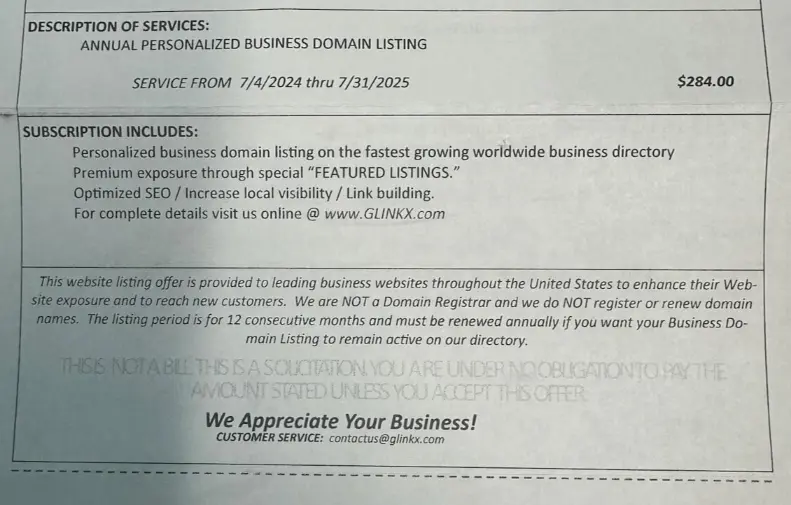Domain Name Scams Lakewood Ranch
Tips for Domain Name Scams
Why do Scammers Target Domain Names
Domain name scams prey on confusion. Many scammers send out phishing emails or letters that look official (known as domain slamming). These messages may claim your domain is about to expire or that you need to renew your listing in a directory (which isn't the same as domain renewal). They often use urgent language and scare tactics to pressure you into paying for unnecessary services or overpriced renewals. Domain name owners often do not understand domain name registration or the services around domain names.
Domains are valuable resources, especially for businesses. Scammers try to trick their victims into paying for fake services or similar domain names (known as typosquatting). to trick people into visiting a malicious website. These fake sites might steal personal information or spread malware.
Tips to Avoid Domain Name Scams
- Be cautious of unsolicited emails or letters about your domain.
- Always double-check the sender's information before responding.
- Look up your domain registrar's contact information directly from their website and contact them directly if you have any questions about renewal.
- Don't be pressured into making a quick decision.
- Be wary of offers that seem too good to be true.
Scam or Not A Scam?
While not an illegal scam, legitimate domain name registrars do solicit additional business by up-selling unnecessary services. Examples include:
Premium DNS Services: Basic DNS (Domain Name System) management is usually included with domain registration. Unless you have a complex website setup, you likely don't need advanced features offered in paid upgrades.
SEO Packages: Search Engine Optimization (SEO) is a complex field and best handled by a website design agency. Registrars services can be ineffective or generic.
Email Accounts: Many registrars offer email hosting bundled with domain registration. However, there are often better deals on dedicated email hosting services with more features and storage space.
Website Builders: Some registrars might push website builder tools that may seem convenient but can be restrictive and have limitations on customization.
Tips To Become More Aware About Domain Name Scams
Know Your Registrar: Be familiar with who your domain registrar is. If you're unsure about an email, contact your registrar directly through their official website. Do not reply to or click on an email.
Know your domain name services: If you did not purchase a domain name service, then you do not need to worry about renewal of a service that does not exist.
Enable Domain Locking: Many registrars offer domain locking, which prevents unauthorized transfers of your domain name.
Stay Informed: Scammers adapt their tactics, so stay updated on common domain name scams. Resources like the Federal Trade Commission (https://www.ftc.gov/) can be helpful.
Too-Good-To-Be-True Offers: Be skeptical of unsolicited offers for SEO services or domain "help".
Misspelled Words and Grammatical Errors: Phishing emails and fake notices often have typos or grammatical mistakes. Legitimate communications from your registrar should be professional and error-free.
Read the notice. In the example below note the description for "personalized business domain listing". Also notice the very deceptive, very light, almost unreadable statement that "This is not a bill..... just above the "We Appreciate Your Business!"
